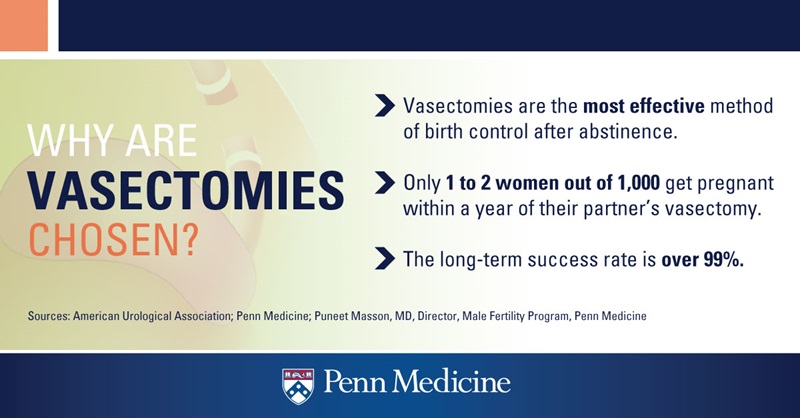Once a Man Stops Producing Sperm, Does It Ever Come Back

Each year, 500,000 men in the US head to the urologist for what's commonly called the "little snip."
That snip is a vasectomy, a male sterilization procedure that blocks sperm from reaching semen, says the American Urological Association (AUA).
Puneet Masson, MD, Director of the Male Fertility Program at Penn Medicine, said male sterilization with vasectomies is the 4th most common form of birth control in the US.
Although vasectomies are common, knowledge about them isn't quite as common. Here are seven things you might not have known about vasectomies.
They are extremely effective
The AUA explained that after a vasectomy, you still produce sperm. However, it is soaked up by your body and cannot reach the semen, meaning you won't be able to get a woman pregnant.
"Vasectomies are one of the best forms of birth control," said Dr. Masson.

After abstinence, vasectomies are considered the most effective method of birth control due to their long-term success rate of over 99%. In fact, only 1-2 women out of every 1,000 end up pregnant within a year of their partner receiving a vasectomy.
But you still need to be careful
"Theoretically, you could get your partner pregnant right after a vasectomy if there is still sperm upstream of where the vasectomy was," Dr. Masson warned.
Your sperm count will decrease gradually after a vasectomy. "You should have your urologist test a sample of your semen after approximately 8 weeks or 20 ejaculations following the vasectomy to make sure it's free of sperm," recommended Dr. Masson.
The US National Library of Medicine (NLM) recommends preventing pregnancy by using another form of birth control until the absence of sperm has been confirmed.
It won't affect your sex life
Dr. Masson had no hesitations about identifying the biggest myth surrounding vasectomies. "You will not experience any differences in your sexual function or pleasure. You will still be able to have sex and ejaculate, and everything will feel the same."
And that is probably a relief to men and women everywhere.
Recovery is easy
Recovery from a vasectomy is pretty easy. According to the NLM, most men return to work 2-3 days later, and can resume physical activity in 3-7 days.
Recovery involves a happy pastime: sitting in front of the TV. And that might be a reason that there is a noticeable spike in the amount of vasectomies around the Super Bowl or March Madness—a trend appropriately deemed "Vas Madness" by many urologists and ESPN.
"When recovery is sitting on the couch all weekend with the TV on and a bag of frozen peas, it makes sense that many men choose to do it when they will be able to fully enjoy their TV time," explained Dr. Masson.
It's a brotherhood
If you're considering a vasectomy but aren't quite sure yet, don't hesitate to talk to men who have had them.
Dr. Masson said, "There is a camaraderie among men who have had vasectomies, and these men are very open to talking about it. Peer-to-peer conversation is a great way to realize that vasectomies truly are a good, safe option."
It's the final cut...
"Vasectomies should be considered permanent," said Dr. Masson, meaning it's not something to get done on a whim.
"It's very common for men and couples who never want children or don't want any more kids to choose a vasectomy," says Dr. Masson. "We never judge them, but we will not do the procedure until we're positive they understand that it's permanent."
The Association of Reproductive Health Professionals agrees, stating that vasectomies should never be performed if there is any chance that you might want to father children in the future.
…Sort of
That being said, there are ways to reverse the procedure. "Life is dynamic. Relationships change, and desires can change with new relationships," said Dr. Masson.
During a reversal, the AUA explained, a surgeon reconnects the pathway for sperm to get into the semen, giving you back the ability to get your partner pregnant.
Also read: Penn Vasectomy Reversal

Dr. Masson said that the effectiveness of a reversal might depend on the length of time since the vasectomy.
"If the reversal is within 10 years of the vasectomy, the success rate is about 60 to 75%. But after 15 years, it can drop to 30%," Dr. Masson explained.
Effectiveness is also determined by the woman's fertility, so it's important to consider her reproductive health before choosing a vasectomy reversal.
"Factors such as older age, or medical conditions such as endometriosis or polycystic ovarian syndrome, can reduce a woman's fertility," Dr. Masson said. "In those cases, the couple will still struggle, so a reversal might not be the best option."
If you're interested in male sterilization or a vasectomy reversal, contact Penn Medicine's Urology Program to learn more about your options.
Once a Man Stops Producing Sperm, Does It Ever Come Back
Source: https://www.pennmedicine.org/updates/blogs/health-and-wellness/2019/march/7-things-about-vasectomies
0 Response to "Once a Man Stops Producing Sperm, Does It Ever Come Back"
Postar um comentário